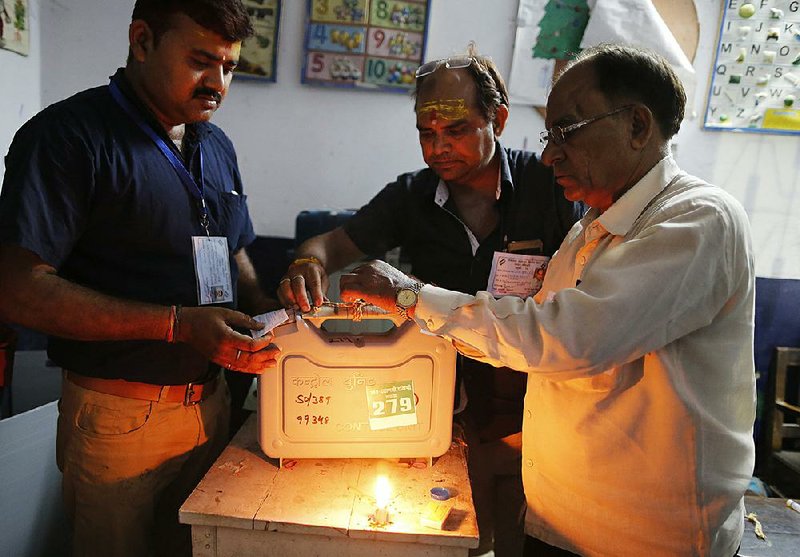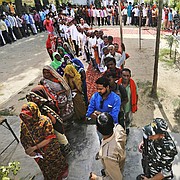KOLKATA, India -- Voting in India's mammoth national election ended Sunday with the seventh and final phase of a grueling poll that lasted more than five weeks.
Vote counting begins on Thursday, and the election result will likely be known the same day.
The election is seen as a referendum on Prime Minister Narendra Modi's Hindu nationalist party, the Bharatiya Janata Party, and its allies. Exit polls suggest that the party and its allies will secure more than the 272 seats needed to form the next government, though Indian television channels have had a mixed record of predicting election results.
The Bharatiya Janata Party's main opposition is the Congress party, led by Rahul Gandhi, the scion of the Nehru-Gandhi dynasty that has produced three prime ministers.
Total voter turnout in the national election was 64.9%, the national election commission said, up from 58% in the last national vote in 2014.
Gandhi questioned the way the election was conducted by the autonomous Election Commission, saying the election schedule was manipulated to help Modi's party.
"The [Election Commission] used to be feared & respected. Not anymore," Gandhi tweeted Sunday evening, without giving any details.
Sunday's voting covered Modi's constituency of Varanasi, a holy Hindu city where he was elected in 2014 with a margin of over 200,000 votes. Modi spent Saturday night at Kedarnath, a temple of the Hindu god Shiva nestled in the Himalayas in northern India.
The final election round included 59 constituencies in eight states. Up for grabs were 13 seats in Punjab and an equal number in Uttar Pradesh, eight each in Bihar and Madhya Pradesh, nine in West Bengal, four in Himachal Pradesh and three in Jharkhand and Chandigarh.
In Kolkata, the capital of West Bengal that was formerly known as Calcutta, voters lined up outside polling stations early Sunday morning to avoid the scorching heat, with temperatures reaching 100 degrees Fahrenheit. Armed security officials stood guard in and outside the centers amid fear of violence.
The election, which began April 11, was largely peaceful -- but West Bengal, located in eastern India, was an exception. Modi is challenged there by the state's chief minister, Mamata Banerjee, who heads the more inclusive Trinamool Congress party and is hoping for a chance to go to New Delhi as the opposition's candidate for prime minister.
Modi visited West Bengal 17 times in an effort to make inroads with his Hindu nationalist agenda, provoking sporadic violence and prompting the Election Commission to cut off campaigning there.
On Sunday, Nirmala Sitharaman, a Bharatiya Janata Party leader and the country's defense minister, accused Banerjee's supporters of attacking her party members and preventing them from voting at several places in six of the nine constituencies in West Bengal. She did not provide details.
Banerjee denied the accusation and said Modi's government used security forces to intimidate her party's supporters.
Prodeep Chakrabarty, a retired teacher in Kolkata, said Modi's Bharatiya Janata Party was desperate to win some seats against Banerjee's influential regional party.
"People are divided for many reasons. We have to wait for a final outcome to see who people are voting for. Things are not predictable like before," he said.
Minorities in India, especially Muslims, who comprise about 14% of the country's 1.3 billion people, criticize Modi for his Hindu nationalist agenda. Modi's party backed a bill that would make it easier to deport millions of Bangladeshis who have migrated to India since Bangladesh's independence in 1971.
The bill, however, eases a path to citizenship for Hindus, Sikhs, Parsees and Jains -- non-Muslims -- who came from Afghanistan, Bangladesh and Pakistan over decades.
Voters were also up early Sunday in Varanasi in Uttar Pradesh state, where election workers arranged for drinking water, shade and fans to cool them down.
"I straightaway came from my morning walk to cast my vote and was surprised to see enthusiasm among the voters," said Ramesh Kumar Singh, who was among the first to vote. "There were long queues of people waiting patiently to cast their votes, which is a good sign for democracy."
During the election campaign, Modi played up the threat of Pakistan, India's Muslim-majority neighbor and archrival.
Opposition parties have challenged Modi over an unemployment rate of 6.1% and farmers' distress aggravated by low crop prices.
Information for this article was contributed by Biswajeet Banerjee of The Associated Press.
A Section on 05/20/2019


